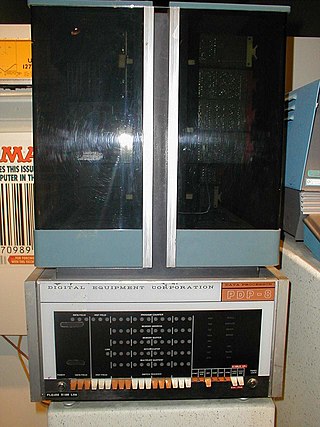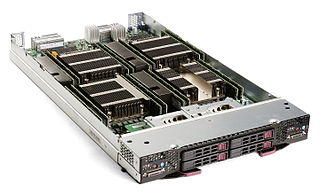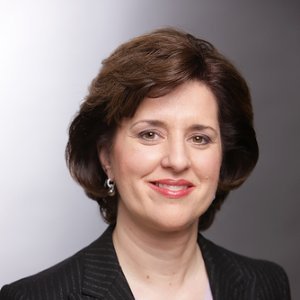
Compaq Computer Corporation was an American information technology company founded in 1982 that developed, sold, and supported computers and related products and services. Compaq produced some of the first IBM PC compatible computers, being the second company after Columbia Data Products to legally reverse engineer the BIOS of the IBM Personal Computer. It rose to become the largest supplier of PC systems during the 1990s before being overtaken by Dell in 2001. Struggling to keep up in the price wars against Dell, as well as with a risky acquisition of DEC, Compaq was acquired for US$25 billion by HP in 2002. The Compaq brand remained in use by HP for lower-end systems until 2013 when it was discontinued. Since 2013, the brand is currently licensed to third parties for use on electronics in Brazil and India.

A minicomputer, or colloquially mini, is a type of smaller general-purpose computer developed in the mid-1960s and sold at a much lower price than mainframe and mid-size computers from IBM and its direct competitors. In a 1970 survey, The New York Times suggested a consensus definition of a minicomputer as a machine costing less than US$25,000, with an input-output device such as a teleprinter and at least four thousand words of memory, that is capable of running programs in a higher level language, such as Fortran or BASIC.

3Com Corporation was an American digital electronics manufacturer best known for its computer network products. The company was co-founded in 1979 by Robert Metcalfe, Howard Charney and others. Bill Krause joined as President in 1981. Metcalfe explained the name 3Com was a contraction of "Computer Communication Compatibility", with its focus on Ethernet technology that he had co-invented, which enabled the networking of computers.

Palm is a line of personal digital assistants (PDAs) and mobile phones developed by California-based Palm, Inc., originally called Palm Computing, Inc. Palm devices are often remembered as "the first wildly popular handheld computers," responsible for ushering in the smartphone era.
Tandem Computers, Inc. was the dominant manufacturer of fault-tolerant computer systems for ATM networks, banks, stock exchanges, telephone switching centers, 911 systems, and other similar commercial transaction processing applications requiring maximum uptime and zero data loss. The company was founded by Jimmy Treybig in 1974 in Cupertino, California. It remained independent until 1997, when it became a server division within Compaq. It is now a server division within Hewlett Packard Enterprise, following Hewlett-Packard's acquisition of Compaq and the split of Hewlett-Packard into HP Inc. and Hewlett Packard Enterprise.
Cray Inc., a subsidiary of Hewlett Packard Enterprise, is an American supercomputer manufacturer headquartered in Seattle, Washington. It also manufactures systems for data storage and analytics. Several Cray supercomputer systems are listed in the TOP500, which ranks the most powerful supercomputers in the world.
Packard Bell Electronics, Inc., was an American computer company independently active from 1986 to 1996, now a Dutch-registered computer manufacturing brand and subsidiary of Acer Inc. The company was originally founded in 1986, after Israeli-American investors bought the trademark rights to the Packard Bell Corporation from Teledyne. The investors wanted to name their newly formed personal computer manufacturing company producing discount computers in the North American markets. In the late 1990s, Packard Bell became a subsidiary of Japanese electronics conglomerate NEC, Packard Bell NEC. In 1999, NEC stopped its North American operations and focused squarely the division on the European market, where it continued to sell PC and laptop under the Packard Bell name. In 2006, NEC divested Packard Bell, and in 2008, the brand was acquired by the Taiwanese consumer electronic firm Acer, in the aftermath of their takeover of Gateway, Inc.
Michael David Capellas is an American executive in the computer and telecommunication industries. Capellas served as chairman and CEO of First Data Corporation, acting CEO of Serena Software, chairman and CEO of Compaq Computer Corporation until its merger with Hewlett-Packard where he became president of the post-merger company briefly, and president and CEO of WorldCom where he led its merger with Verizon.

A blade server is a stripped-down server computer with a modular design optimized to minimize the use of physical space and energy. Blade servers have many components removed to save space, minimize power consumption and other considerations, while still having all the functional components to be considered a computer. Unlike a rack-mount server, a blade server fits inside a blade enclosure, which can hold multiple blade servers, providing services such as power, cooling, networking, various interconnects and management. Together, blades and the blade enclosure form a blade system, which may itself be rack-mounted. Different blade providers have differing principles regarding what to include in the blade itself, and in the blade system as a whole.
TACL is the scripting programming language which acts as the shell in Tandem Computers/NonStop computers.

The Trusted Computing Group is a group formed in 2003 as the successor to the Trusted Computing Platform Alliance which was previously formed in 1999 to implement Trusted Computing concepts across personal computers. Members include Intel, AMD, IBM, Microsoft, and Cisco.

ProLiant is a brand of server computers that was originally developed and marketed by Compaq, Hewlett-Packard, and currently marketed by Hewlett Packard Enterprise. After Compaq merged with Hewlett-Packard (HP), HP retired its NetServer brand in favor of the ProLiant brand. HP ProLiant systems led the x86 server market in terms of units and revenue during first quarter of 2010. The HP ProLiant servers offer many advanced server features such as redundant power supplies, Out-of-band management with iLO or Lights-out 100, Hot-swap components and up to 8-Socket systems.

NeoPlanet was a Trident-shell graphical web browser initially released in 1997 by New York–based Bigfoot International, Inc. and later maintained and developed by its subsidiary NeoPlanet, Inc. It was one of the first browsers to be fully skinnable.

Interex EMEA was the EMEA HP Users Organisation, representing the user community of Hewlett-Packard computers.

The Hewlett-Packard Company, commonly shortened to Hewlett-Packard or HP, was an American multinational information technology company headquartered in Palo Alto, California. HP developed and provided a wide variety of hardware components, as well as software and related services to consumers, small and medium-sized businesses (SMBs), and large enterprises, including customers in the government, health, and education sectors. The company was founded in a one-car garage in Palo Alto by Bill Hewlett and David Packard in 1939, and initially produced a line of electronic test and measurement equipment. The HP Garage at 367 Addison Avenue is now designated an official California Historical Landmark, and is marked with a plaque calling it the "Birthplace of 'Silicon Valley'".

Mary T. McDowell is an American technology executive. From 2019-2021, she served as CEO of Mitel, a global business communications provider. Prior to that, McDowell served as CEO for Polycom from 2016 until its sale to Plantronics in 2018. While at Polycom, she led a strategic pivot to open ecosystems and bought Obihai to strengthen the company’s phone and cloud products. She serves on the boards of Autodesk and Informa plc.
Christopher G. Hipp was an American inventor and serial entrepreneur who received a patent for his invention of the blade server, a compact, stripped-down computer server that includes all of the necessary components to operate as a computer while taking up minimal space on a standard rack mount and minimizing power consumption.
Utimaco Atalla, founded as Atalla Technovation and formerly known as Atalla Corporation or HP Atalla, is a security vendor, active in the market segments of data security and cryptography. Atalla provides government-grade end-to-end products in network security, and hardware security modules (HSMs) used in automated teller machines (ATMs) and Internet security. The company was founded by Egyptian engineer Mohamed M. Atalla in 1972. Atalla HSMs are the payment card industry's de facto standard, protecting 250 million card transactions daily as of 2013, and securing the majority of the world's ATM transactions as of 2014.

The Hewlett Packard Enterprise Company (HPE) is an American multinational information technology company based in Spring, Texas, United States.











